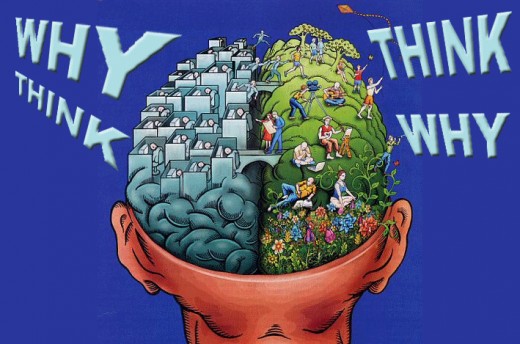Think Why -v- Why Think

From my earliest recollections I have always been thinking about the 'why' of everything, and soon recognised that this made me different from most folk, who had 'why think' as their credo.
Thinking about 'things' all the time takes it's toll, and has it's advantages and disadvantages.
I'm sought after for Trivial Pursuit games and quiz nights, as my mind has accumulated stacks of useless information whilst sifting and sorting the wheat from the chaff, useless....unless you are playing those sort of games.
But equally I have always been the guy you find in the kitchen at parties, as I have driven people away with my serious probing of their psychology as we speak.
I'm an observer, rather than a participant, and it's something which makes people who do not dissect every comment and action steer clear of me.
After about 15 years of thinking, I realised that it was a curse rather than a blessing (unless I'm playing Trivial Pursuit) and that there is much to be said for the truth of the statement 'ignorance is bliss' for one cannot be concerned about that which you have no knowledge about.
It's shaped my life, for I have always been making statements that cause people to reconsider their concepts, search for their own truths and often open mental doors that they either never knew they had, or had kept tightly shut for their own reasons.
I apologise to my readers and those who know me for doing this, you see one of the areas that I displayed my ignorance in, was in assuming early in life that if I could ONLY get everyone to think, the world would improve dramatically.
But thinking causes problems for folk, at least for the first few years until they have 'collected their thoughts' and formed conclusions, learned how to assimilate information and process it without emotional attachment.
There lies the rub, as Shakespeare said, for most people cannot separate from the emotive response, and therefore suffer from their rational mind creating conflict with their emotive thinking.
Put simply, common sense tells them one thing, but what they feel tells them a different story.
Most people will simply switch to one side of the position or the other, swing towards rational or emotive.
Which is fine and dandy provided that you apply the correct polarisation to the given circumstance.
If you are a rationalist, you can deny the emotive side completely and just live with whatever the latest take is in rational circles.
I remember reading Stephen Hawkins's 'Brief History of Time' and realising that he needed to spend about a third of his book establishing why all the other previous theory's about time were incorrect and his was THE right one.
Rational thought is like that, it needs to try to prove that anything which it cannot experience is actually incorrect, in order to substantiate the claims it stands upon.
For me rational thought was proven incorrect when I experienced the Holy Spirit working in and through me, that completely destroyed my previous hypothesis about life the universe and everything, and opened up an emotive side of my personality I never though or accepted existed, prior to that experience.
Had that been my ONLY experience with the Holy Spirit, I could be excused for dismissing it as something else, I could have rationalised it away, as so many other do, but it was not a solo experience, and after a multiple of subsequent experiences, I could not deny that the Holy Spirit was changing me from one personality to another.
So thinking for me was a productive experience that took me from A to Z and let me find a life of contentment that I had never had as a rationalist.
But obviously not all people who start thinking deeply will find that contentment.
If something I said or wrote sets someone off on the path to establishing what they think or believe, am I to blame or be credited with the result?







